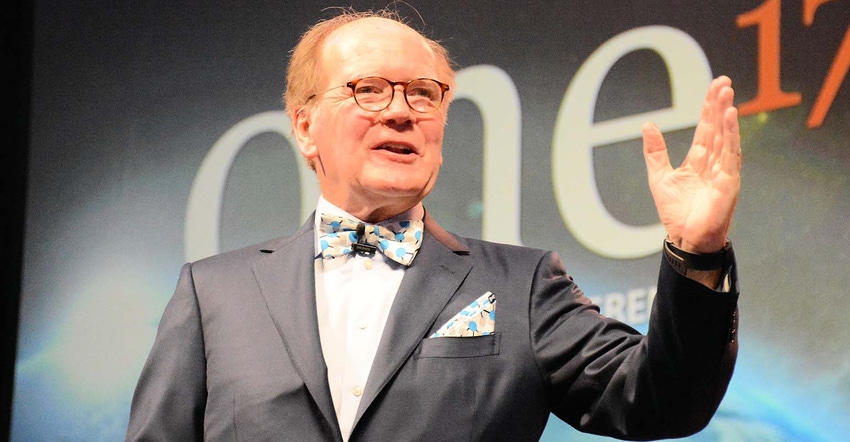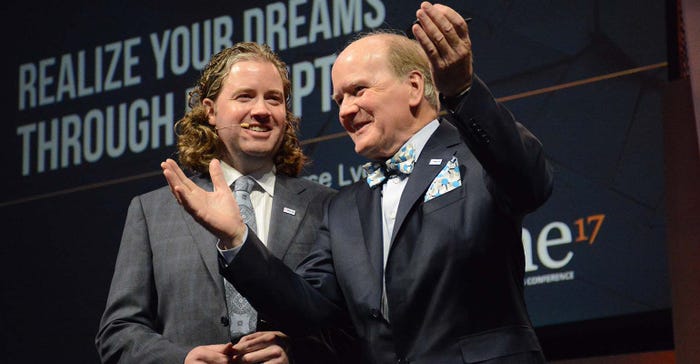
Alltech CEO and self-made billionaire Pearse Lyons died March 8 of complications from heart surgery. He was 73. This reflection is based, in part, on a profile written in 2008.
Pearse Lyons was hands down the most interesting scientist, entrepreneur and businessman I ever meet. Everything he did was high energy, whether it was belting out an Irish tune with 300 friends at a brew pub, or preaching the gospel of sound science as CEO and founder of Alltech, his international agribusiness and beverage company located in Lexington, Ky.
Lyons was an Irish-born scientist living out a bluegrass American dream on Kentucky soil. Educated in the United Kingdom in fermentation and distillation, he moved to Lexington in 1976 and began meeting with Midwest farmers who needed help making ‘gasohol’ from corn.
Even then Lyons was ahead of his time. His first textbook, published 38 years ago, was titled “A step to energy independence” and focused on alternative fuels.
When gasohol waned Lyons redirected his scientific curiosity toward livestock. He developed natural yeast fermentation and natural enzyme technology as the driving force for new products in the animal feed industry.
He started Alltech in 1980 out of his garage, focusing on people, science - and family. The letters “A-L-L” came from his then 5-year-old daughter, Aoife Louise Lyons. His 3-year-old son Mark chose the company colors, and his wife Deirdre created the logo itself, with a microscope inside the shapes of the letters (see graphic).
When I first interviewed Dr. Lyons, Alltech was a thriving $450 million company with customers in over 100 countries. The company employed 2,000 people worldwide with revenues growing at a 25% annual clip. Today the $3 billion family-owned company has 5,000 employees in 80 offices with a presence in 130 countries.
Back then I asked, what was the key to success since arriving from Ireland?
“I don’t think we’ve ever lost the common touch,” he told me. “We’re in it for people as much as we’re in it for profit.
“We will only be limited by our imagination and ability for hard work,” he continued. “I always tell people, don’t worry if it’s wrong, just go do it. Surround yourself with good people and just do it.”
Charismatic figure
Lyons was one of the feed industry’s most charismatic, engaging figures. His message always hammered on science-based solutions. But Lyons never set out to be a scientist as a youngster. He was aghast when he first set eyes on a periodic table. At University College Dublin he drifted toward science because he found it interesting, and ended up getting his PhD in England.
With Ireland’s rich history in brewing he got into the practical application of working with yeast in the distilling industry. Besides animal feed products, Alltech also produces Kentucky Ale along with other adult beverages sold around the world.
“The company was started to provide embryo ingredients for the ethanol industry in the early ‘80s,” Lyons told me. “In those days we selected the site to make ethanol, ran the plant, ensured its profitability. Somewhat ironically 15 years later companies like Broin took the same model.
“I was concerned ethanol would go up and then down, concerned that ADM and Cargill would become the giants of this world, which they did. We would be left with the crumbs from the rich man’s table. So we looked at other ways to apply our technology. I saw an opportunity to use yeast-derived products in the feed industry. Being a salesman I was able to make a profit from it.”
Can science solve food problems?
I asked Lyons what role science could play in solving food and feed problems.
“The key to our future is to be curious about science, to be at the cutting edge in a curious way,” he said. “We do a lousy job of educating people about the necessity of science. Let’s not bog them down with the periodic table. Instead, tell them what science does for you, the exciting part.
“We have to have a system which makes science interesting to these kids and if they have a short attention span, we have to play to that and make it interesting.”

Pearse Lyons’ son Mark (l), Alltech executive vice president, will become the company’s chairman and president.
Legacy
I recall thanking Dr. Lyons for the opportunity to talk, and offered one last question. What did he think would be his legacy?
“Hopefully it’s that we really made a difference and brought some excitement to rural ag and science,” he told me.
“I didn’t grow up with a silver spoon. My dad was an electrician and didn’t have a high school education. So sometimes I have to pinch myself. The American dream is alive and well at Alltech, and Pearse Lyons is thankful and fortunate to be living the American dream.”
The opinions of the author are not necessarily those of Farm Futures or Farm Progress.
About the Author(s)
You May Also Like






